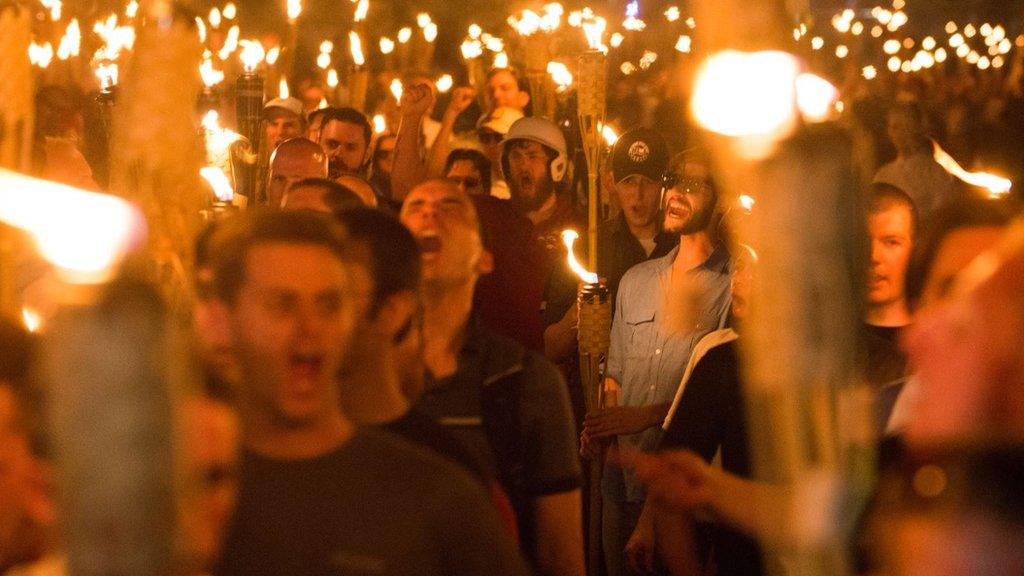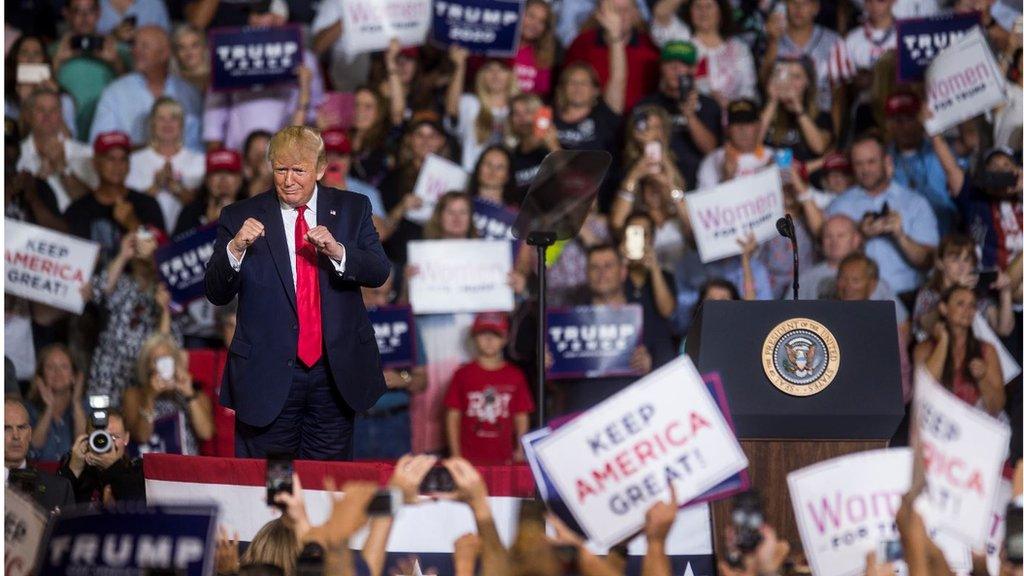El Paso and Dayton: Two mass shootings - will anything change?
- Published
'Do something!' Mourners at the vigil in Dayton demand action from Ohio's Republican governor.
It's become a familiar refrain after every mass shooting in the US. Will this time be different? Will outrage over the violence compel political action, as it has done in the UK after Dunblane, Australia after Port Arthur and, most recently, New Zealand after Christchurch?
Among gun control activists, there is a certain amount of resignation whenever a new incident splashes across the headlines. If public sentiment did not force action after the 2012 Newtown shooting, when 26 people - including 20 young children - were killed in a Connecticut school, then nothing will ever change.
If the double tragedy of El Paso and Dayton ends up being different, however, here are a few possible explanations.
White nationalist violence
Recent mass shootings in the US have been attributed to a variety of causes - disaffected youth (Parkland and Santa Fe), mental illness (Annapolis), workplace conflict (Virginia Beach) and family discord (Sutherland Springs).
The deadliest such incident in modern US history, the 2017 shooting at a music concert in Las Vegas that claimed 58 lives, still has no attributed motive.
In this case, however, all evidence indicates that the El Paso shooting was a calculated political act drawn from the white nationalist rhetoric that has become increasingly prominent in modern US politics. In that way, it's more akin to last October's Pittsburgh synagogue shooting, which prompted discussions about rising anti-Semitism in the US, or the 2017 violence in Charlottesville, which served as a jarring display of the strength of the modern white supremacist movement.

White supremacists took part in the Unite the Right march in Charlottesville in August 2017
Although the suspected gunman, Patrick Crusius, has yet to be conclusively tied to the racist manifesto posted on the internet shortly before the attacks, the facts point in one direction. He did not launch this attack in his home town. He drove at least eight hours, from north Texas to within miles of the US-Mexico border, and opened fire in a shopping area frequented by Hispanics. Law enforcement says they are treating the case as an episode of "domestic terrorism".
That puts this incident square in the middle of the ongoing debate about immigration, border security and national identity. Americans in the past have wondered how young men could be drawn to political violence against innocents in other parts of the world. Now they're seeing firsthand that it can happen in their home country, as well.
The nature of the attack could prompt a rethinking of the domestic threat presented by militant white nationalists and ways to stop it, including new gun control measures. Democrats have been quick to offer condemnations, but there are voices on the right as well that have taken up the warnings.
Senator Ted Cruz of Texas, who ran for president against Mr Trump in 2016, denounced, external the gunman's "anti-Hispanic bigotry" and called the violence a "heinous act of terrorism and white supremacy".
Texas Land Commissioner George P Bush, son of 2016 Republican presidential candidate Jeb Bush, issued a statement saying that "white terrorists" are a "real and present threat", external.
If a consensus grows that there is a threat, the question then becomes how to address it.

A tinderbox of presidential politics
It hasn't taken long for those on the left to point to Donald Trump and other Republican officeholders for employing the kind of rhetoric that might have inspired a white nationalist to murder.
The president has repeatedly labelled undocumented migrants "an invasion", and said European immigration is changing the "fabric of Europe" and not "in a positive way".
At a Florida rally in May, a member of the crowd shouted "shoot them!" when the president wondered how they could stop undocumented migration. Mr Trump responded to the comment with a joke.
Just over a month ago, Texas Senator John Cornyn tweeted that last year Texas was gaining "almost nine Hispanic residents for every additional white resident".

President Trump at a rally in North Carolina in July
Criticism of the Republican response - or lack of response - to mass shootings isn't unusual, of course. The difference this time is that the criticism is being amplified by the Democratic presidential primary contest. Although the first ballots won't be cast for half a year, the campaigning and debating has already begun in earnest.
More than 20 candidates have an incentive to set themselves apart from the pack with aggressive calls for new gun-control measures and condemnation of what they view as incendiary racist rhetoric.
Beto O'Rourke, an El Paso native, has already laid blame for the attack at the president's feet. South Bend Mayor Pete Buttigieg blamed an ideology of white nationalist terrorism that "is being condoned at the highest levels of our government".
Almost every candidate has come out with some new call for gun control as a response.
New Jersey Senator Cory Booker, who has proposed a national gun-licensing programme, said "we have power to stop this" - but the solutions are being blocked by "spineless politicians and folks who are doing the bidding of the corporate gun lobby".
In last week's Democratic debates in Detroit, the issue was only briefly touched upon. Public attention, however, sharpened by the shootings as well as the direct line the candidates are drawing to the president, ensures that at least in the near term there will be prominent voices calling for action.

One step closer in Congress
In the days after the 2012 Newtown school shooting, Congress attempted to enact universal background checks on all gun purchases, including private transactions. Despite bipartisan support in the US Senate, a minority blocked the proposal through parliamentary procedure. The legislation was never even considered by the Republican-controlled House of Representatives.
The dynamic, in at least one chamber of Congress, is different today.
When Democrats took over the House in January of this year, it didn't take long for them to approve similar legislation to the Newtown bill - marking the first time in a quarter century that the lower chamber of Congress has passed sweeping new firearm regulations.
After the dual shootings in El Paso and Dayton, the pressure is now on the Republican-controlled Senate to take up the measure - something Majority Leader Mitch McConnell has so far declined to do.
He might be able to withstand the pressure. And even if it comes to a vote, the parliamentary obstacles allowing just 41 Republicans to block passage remain. But several of the senators who backed the bipartisan bill in 2013 are still in office. And with actual legislation from the House on the table, the Senate is the final obstacle keeping a bill from reaching the president's desk, not the first.

A weakened NRA
Back in 2012, the National Rifle Association was near the height of its power and influence in US politics. Through decades of campaigning, the group - which represents millions of gun owners as well as gun manufacturers - had turned gun rights for many Americans into a red-white-and-blue bedecked symbol of God and country.
Many Democrats viewed firearm regulation as ballot-box poison, blaming the issue for, among other defeats, Al Gore's narrow presidential loss in 2000. A candidate with a negative rating from the NRA practically ensured a well-funded opponent and grass-roots opposition in many parts of the US.
Even after the Newtown massacre, the trend in firearm legislation in many parts of the country was toward greater freedoms - such as the right to carry concealed weapons - not less. And in 2016 its early and active support for Mr Trump's presidential campaign, considered a gamble at the time, was rewarded with his surprise victory.
A soldier and a baseball coach recall how they tried to save children from the El Paso shooting
Recently, however, the NRA has fallen on hard times. The organisation's revenue dropped by $56m in 2017, due to lower membership dues and contributions.
It's been beset by an internal power struggle that has spilled into the civil courts and targeted by criminal corruption probes in New York and Washington, DC.
Even the NRA's sheen of electoral invulnerability has begun to dull. In the 2018 mid-term elections it was outspent by gun-control groups aided by contributions from former New York Mayor Michael Bloomberg. Several prominent gun-control advocates, such as Lucy McBath in Georgia, won in battleground districts.
This is not the same NRA that was able to aggressively push back against background-check legislation even in the aftermath of the Newtown shooting. It still has plenty of political muscle, of course, but cracks in the foundation are visible.

And unchanged... some familiar obstacles
If all of the above are reasons why the situation may be different this time around, there are still plenty of reasons why it might be just the same.
The Senate roadblocks to national legislation outlined earlier are very real and very significant. What's more, the Senate is currently in recess until September, and if the past is any indication, the intensity of calls for gun control diminish as the tragedies recede from memory.
The president's support - or even his signature on legislation that is passed - is also not guaranteed.
What's Donald Trump said about guns and gun control?
After the 2018 Parkland shooting, Mr Trump expressed some interest in backing gun-control legislation, going so far as to say he was in favour of comprehensive background check despite NRA opposition.
After meeting with NRA leadership the president quickly walked back those comments, however, and later told the group's annual convention that Second Amendment gun rights were "under siege" but he would always defend them as president.
Although Mr Trump tweeted a condemnation of the El Paso shooting as a "hateful act", he will be pressed to go further in condemning white nationalist violence. The fact that Democrats are accusing him of contributing to the rhetorical environment that encourages such bloodshed might make the president disinclined to take more concrete action.
He could view doing so as tacitly admitting responsibility or fault - something Mr Trump has proven he is loath to do.
If that's the case, this could end up a reprise of the president's response to the 2017 Charlottesville clashes between white supremacists and counter-demonstrators, in which his early condemnations of the Nazi sympathisers was followed by a contentious press conference where he laid blame on "both sides".
The more Democratic candidates like Mr O'Rourke lob accusations at the president, the more probable it is that he will dig in, fire back and further fan the flames. Such an environment is hardly conducive to bipartisan solutions in Congress.
